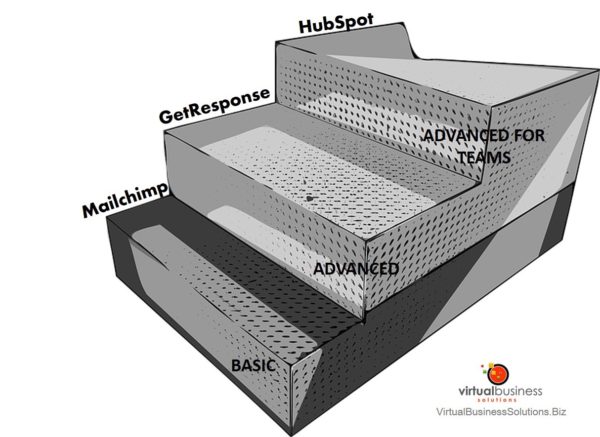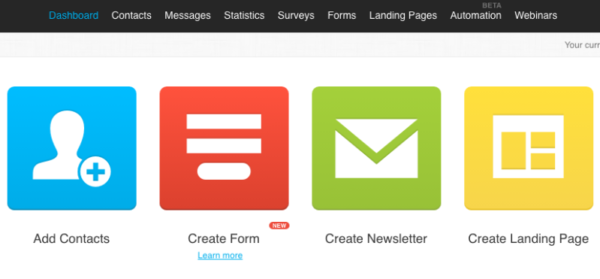By Itai Elizur
Research shows that 76% of businesses who are successful at marketing online, place great emphasis on marketing automation tools, saying they are vitally important to the success of their marketing strategies.
At the other end of the scale, those businesses who enjoy less success, don’t have a marketing strategy, don’t make use of all the features the tool offers, and lack knowledge.
It would certainly seem that small businesses specifically, struggle to choose the right tool for their needs, and then battle to use it.
This article lists four of some of the biggest marketing automation trends and best of all, offers solutions based on the numbers, which should provide real value to those searching for marketing automation solutions.
Biggest barrier is lack of strategy
The biggest barrier to using marketing automation software is a lack of strategy.
About 10% more large businesses use marketing automation software than do SMB’s. This would suggest that 50% of both large and small to medium sized companies, don’t even have an online marketing strategy. When they select a marketing automation tool, they don’t have a clear objective as to what they want from the tool.
Not understanding online marketing is a huge factor, because many businesses may think that marketing automation is the bee-all and end-all to online marketing. The truth is that the software is only a tool used to implement a strategy, and without the strategy, the marketing automation platform won’t accomplish much.
Suggestions for your small business
Before choosing a marketing automation solution, plan your strategy first. Once you are clear on your plan, you need to choose the right platform to achieve your goals, because they all do different things.
While we’re on the topic of choosing the right software…you should know that there are different levels of tools available, and choosing the wrong one is probably one of the greatest reasons for the next trend, which is that most software features are not being utilized.
To drive home the point, let’s use the brands of three of the top platforms, to demonstrate the level each one is on:

Image Credit: VirtualBusinessSolutions.Biz
Level 1: Basic email marketing. An example of software on this level would be Mailchimp. Software on this level is the least expensive and is limited to basic email marketing features. If you’re a beginner to online marketing, this is likely the level you’re currently on. Prices per month range from about $15 to $19.
Level 2: Advanced marketing for small businesses. An example of software in this sphere is GetResponse’s pro package. Developed with the small business in mind, it consists of all the features necessary to run an entire online marketing campaign. Typically, the cost of these tools are between $45 – $129.
Level 3: Advanced marketing for stable businesses with teams. An example of a platform in this arena, would be HubSpot. These tools usually include CRM capabilities, which are not necessary for the typical small business, depending on the niche. These tools usually cost between $200 and $900pm.
Two years ago there were 211 marketing automation platforms, so you can have your pick, but you need to do your homework to find the right one.
So, first things first…before selecting your marketing automation platform, plan your marketing strategy.

Image Credit: Smart Insights
From the graph, we can see that the most underutilized feature is analytics. One of the most used features are landing pages, although businesses report that they are only moderately effective – but more on that later.
42% of businesses say that complexity of the marketing automation software is a big barrier. Since most companies sign up for the wrong level tool, we can assume that this is the root cause of the problem. Businesses are paying for features they don’t need, because they joined the wrong “level” tool.
Suggestions for your small business
Do your homework. Read reviews on the various tools. Most offer free trials, so test them out to see if they “work” for you. Remember to plan your marketing strategy first, and then choose the tool that will best implement it.
And if you want to cheat, GetResponse is known to be the easiest tool for small businesses because of its logic and interface.

The GetResponse marketing automation platform interface is modern and easy to use.
Lack of marketing automation know-how
Only 14% of businesses rate their marketing automation knowledge as advanced, while a whopping 49% only have the most basic know-how. This is the reason why most of the Big Boys charge an onboarding fee, forcing companies to learn how to use the tool.
The root cause of a lack of marketing automation know-how is a combination of a lack of time, and the lack of understanding about how the tool can benefit your business. On the other hand, marketing influencers (marketing experts) say that marketing automation is very important to the overall performance of their marketing efforts.

Image Credit: Ascend2
Having said that, it’s all too understandable that online marketing can be quite daunting as it can get rather complex. Small business owners know that they need to market online, but when they get down to it, learning the ropes is time consuming.
Suggestions for your small business
There’s no way around it: at some stage, you’re going to need to use a marketing automation tool, and to master it, you’re going to have to learn how to use it. All of them provide help in the form of blogs, tutorials, videos, PDF’s, etc. Or consider hiring a freelancer to set it up and manage it for you.
Landing pages only moderately effective
For small businesses, the landing page builder feature of marketing automation tools is the most important element, as it saves time and know-how and business owners don’t need to hire a professional to build them.
But research shows that 45% of businesses say the landing pages they create via the templates provided by marketing automation platforms, are only moderately effective.
If the statistics are correct, and only 14% of businesses peg their marketing automation know-how at the advanced level, it’s safe to say that:
- Their landing page results are not in line with their expectations, because they don’t know how many conversions they should get.
- They achieve moderate results because although they use the templates provided by the software, they don’t understand what small changes they should make to optimize results.
- They are not testing any of the elements on their landing pages.
- Their landing page copy is written poorly, also due to lack of knowledge. Either they as the business owner, is writing the copy, or they’re hiring the wrong and cheapest writers to compile their copy for them.
Suggestions for your small business
First check that your expectations are in line with the average conversion rates for your industry:

When you know what a good rate is, only then can you make a judgement call about how your own landing page is doing.
If the analytics show that your pages could do with improvement, you either need to learn how to make those improvements, or hire someone who can help you.
Since landing page templates provided by marketing automation software are usually designed by experts who understand the elements that influence, and only need to be tweaked here and there by yourself, you can assume that what’s lacking on your page is good copy. In this case, you’ll need to hire someone who knows how to write words that influence and sell.
The statistics have spoken. It’s probably safe to say that according to these trends, the root cause for businesses that struggle with marketing automation, is that they lack digital marketing knowledge.
Because although these marketing automation platforms eliminate the most arduous chores, they are not miracle cures.
If they want online success, small business owners must first develop a marketing plan, and then choose the right tool to implement their strategy. Finally, in order to get the best value and output they should choose tools and platforms that are aimed for SMBs (multi-service drag and drop functionally) so they can learn and manage these tools themselves and not need to hire external people to manage their marketing efforts.
Itai Elizur is the COO at Inbound Junction, a content marketing agency specializing in helping startups and business increase their online visibility.







